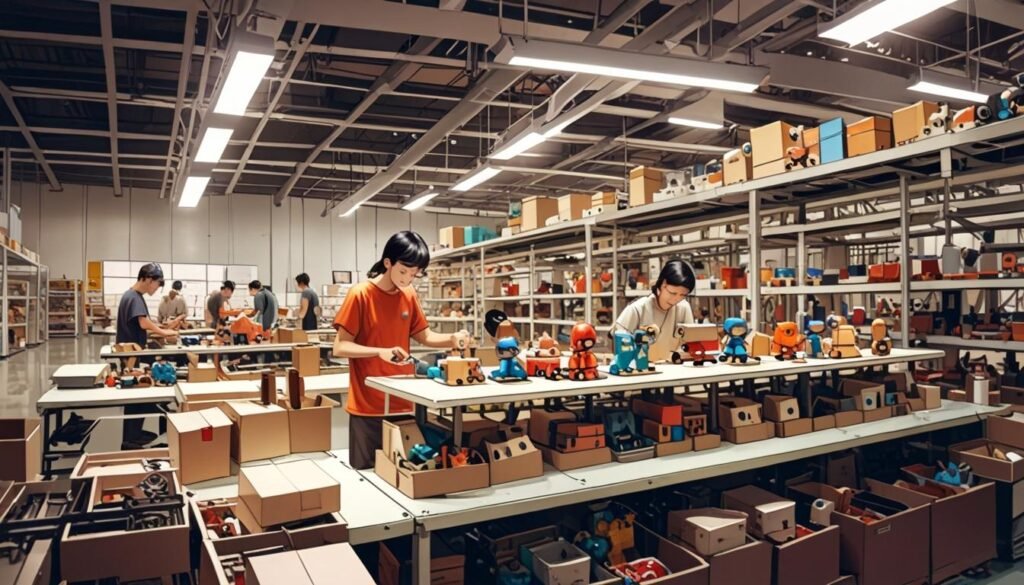**Washington**: Reports reveal significant changes in consumer goods pricing in the U.S. due to new tariffs on Chinese imports, impacting various sectors from toys to essential medicines. Companies like Mattel may increase prices, while Chinese manufacturers face challenges in maintaining output amidst the trade conflict.
Reports have highlighted a significant shift in the dynamics of consumer goods pricing in the United States following the implementation of what are described as “equally imposed tariffs” on imports from mainland China. With approximately 90% of microwaves and fans, and over three-quarters of mobile phones, gaming consoles, and food processing machines imported into the U.S. last year originating from China, the impact of these tariffs is expected to ripple through various sectors. Notably, toys such as dolls, tricycles, and scooters also saw three-quarters of their imports coming from Chinese manufacturers.
Mattel, a prominent California-based toy company known for its Barbie dolls, Hot Wheels cars, and Uno card games, stated that 40% of its production is based in mainland China. The company has indicated it may need to increase sales prices in response to the cost pressures created by the tariffs.
Chad Bown, a senior researcher at the Peterson Institute for International Economics, highlighted the speed and scale of these tariffs. Speaking to the Washington Post, Bown noted, “Tariffs on China are at a higher level, being imposed more quickly and on many new consumer products that were unaffected during ‘Trump 1.0’,” indicating that U.S. businesses could pass a significant portion of these costs onto consumers.
The complexity of supply chains is further emphasised by Allie Renison, the deputy director of SEC Newgate, who previously served as a policy advisor to the UK business secretary. She articulated the challenges faced by Western companies in finding alternative manufacturers, particularly due to the critical role of Chinese raw materials and components in their products. Renison remarked that this transition will depend heavily on regulatory environments in alternative manufacturing countries and their attitudes toward the U.S.
Moreover, the tariffs may jeopardise the supply of essential medicines imported from China. Reports from the Washington Post suggest significant concerns surrounding life-saving drugs, including heparin, which is crucial for the treatment of millions of Americans annually. The main ingredient for this anticoagulant is sourced from China, and disruptions in the supply chain could lead to severe complications in medical treatment.
On the other side of the trade war, Chinese manufacturers have expressed their own challenges. A recent report from the Financial Times featured insights from factory owner Nie in Yiwu, Zhejiang, who leads a Halloween decoration factory that employs 100 people. The owner expressed dismay over the U.S.-China tariff conflict, revealing that reluctance to cut prices for American buyers resulted in lost orders and layoffs of over 10% of her workforce. Nie commented on the resilient work ethic and saving habits of the Chinese people, asserting, “Chinese people think differently from foreigners; they love saving and can live off their savings for years.” She maintained a belief that Chinese industry would ultimately prevail despite current setbacks.
The article further notes that while Yiwu manufacturers are seeking alternative markets in Europe and developing countries, locations like Zhengzhou, which primarily serve the U.S. market, face potential declines in output. Reports from workers at an Apple manufacturing facility in Zhengzhou indicated that increased production in India may reduce operations at their site. The Yiwu camping equipment manufacturers are attempting to adapt by establishing sales networks in regions less dependent on the U.S. market.
As the U.S. and China navigate through a complex array of trade tensions, the implications continue to unfold across various sectors, affecting manufacturers and consumers alike on both sides of the Pacific.
Source: Noah Wire Services

